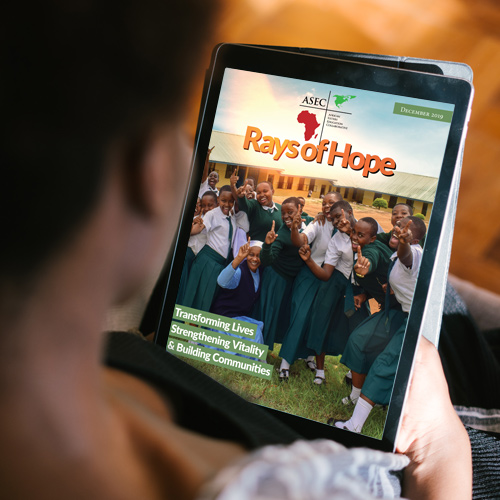According to UNAIDS, there were approximately 36.7 million people worldwide living with HIV/AIDS at the end of 2016.
69% of all people infected with HIV live in Sub-Saharan Africa.
“More than 30 years since HIV/AIDS started rearing its ugly head, it has become one of the most devastating diseases which the human race has ever faced” – Sr. Veronica Chibuzor Iloh, SJGS
Governments, organizations and agencies from all around the world are involved in the fight against this disease.
Development Work
Development work is work aimed at helping a country become more competitive across sectors like health and education.
Historically, development work centered on HIV/AIDS prevention focused on individual behavior change as a solution. This provided limited success, especially for populations of girls and young women.
Now, the focus has changed to a broader scope involving social and economic factors
Sr. Veronica’s Work
African Sisters Education Collaborative (ASEC)’s Sisters Leadership Development Initiative (SLDI) program educates religious sisters on topics like administration and finance.
SLDI alumna Sr. Veronica Chibuzor Iloh, SJGS works in Ebonyin State, Nigeria where she educates the public on underlying factors that make them vulnerable HIV/AIDS.
These factors deal with social and economic weaknesses.
Emerging evidence suggests that economic strategies may contribute to some improvements in social, economic, and health outcomes among women.
Economic Empowerment = A Solution
Through Sr. Veronica’s education and experiences, she believes that economic empowerment is a large part of the solution to handle the HIV/AIDS epidemic. Economic empowerment includes solving other issues such as:
- Poverty
- Gender inequality
- Social exclusion
- Decision making
- Human rights
Sr. Veronica’s Economic Empowerment Plan
Through her work, she created a plan to educate others on economic empowerment to help prevent more cases of HIV/AIDS.
Her program and policy includes:
- Microfinance assistance for the vulnerable households to engage in economic activities
- Vocational training: providing young boys and girls with skills, opportunities, and materials
- Life skills training
- Improving household food security by assisting them to secure farm inputs
- Assisting the vulnerable households secure property and inheritance rights
- Provision of educational support
- Constituting village savings and loan association (VSLA)
Through Sr. Veronica’s teachings, people learn about the many preventive measures they can take against HIV/AIDS.
Sr. Veronica describes herself as a humanitarian aid worker but has a passion for development work.
“There is no sharp distinction between work and the rest of your life, between your interests and passions and your job description. There is an upside to that work that you feel passionately about, and are not doing simply because you are getting paid to,” says Sr. Veronica.

Read Rays of Hope
Learn more about Catholic Sisters transforming poor, rural communities across Africa in our FREE Rays of Hope ebook.
Read It Now »
Mrs. Agu Elizabeth, a caregiver and widow, has used her financial literacy training to improve her business and living situation. Sr. Veronica’s program helped Mrs. Agu get back on her feet with a small donation and financial literacy training. This made a dramatic difference for Mrs. Agu’s ogbono business.
Household Economic Strengthening
Some of Sr. Veronica’s beneficiaries are immediately using their training to improve their lives.
She tells the story of Mrs. Agu Elizabeth, a caregiver and widow, who has used her financial literacy training to improve her business and living situation.
Mrs. Agu was enrolled in Sr. Veronica’s project as a result of her husband’s death which left her household in a state of abject poverty. Mrs. Agu started a business selling ogbono (a type of seed used in the popular Nigerian dish, ogbono soup) before her husband’s death but she was not fully supporting her family. After her husband’s death, this all changed. Her business became her family’s only source of income.
Sr. Veronica’s program helped Mrs. Agu get back on her feet with a small donation and financial literacy training. This made a dramatic difference for Mrs. Agu’s Ogbono business.
She was able to make more of a profit which led to building four rooms and a parlour for her family. Mrs. Agu now supports her family fully and they live comfortably.
Mrs. Agu is thankful for the program and staff that “assist[ed] the poor in Umuegara Community”.

Sr. Veronica believes that vocational training, providing young boys and girls with skills, opportunities and materials is the key to fighting the HIV/AIDS epidemic. Eliminating social and economic weaknesses makes individuals less vulnerable to the disease.
Opportunities, Community, Culture
Her experience as a humanitarian aid worker is rewarding to her; she writes:
“I cannot imagine anything else being as interesting, challenging, exhilarating, and rewarding as some of the jobs I have had. Plus, every now and again, things go right, and you walk away feeling that, for some people, in some places, the world is a better place because of something you did.”
“The people I have met in this line of work are among the most wonderful friends and colleagues I can imagine. The bonds that are formed working together in intense situations are very powerful, and friendships formed over even a few days can be long lasting.”
“Living and working in cultures other than your own can be fascinating and very rewarding. You will also see things that no one else will see (not all of them will be good, mind you, but they will be fascinating, challenging, and sometimes exciting!)”
Future Plans
Sr. Veronica is looking forward to educating more people on economic empowerment.
Thanks to funding by USAID and donations, she has trained over 250 people. In the future, she hopes to train up to 300 with necessary funding.
She feels passionately about her cause and that the HIV/AIDS problem will be solved one day through the work of her fellow sisters.
“My dear sisters in Christ, I chose to write on this topic because it gives joy when you put smile on the faces of these vulnerable people in our society especially those living around us.”









